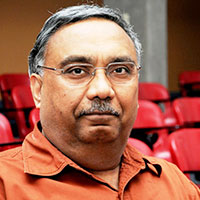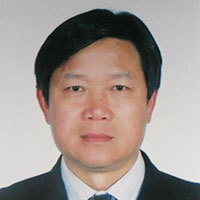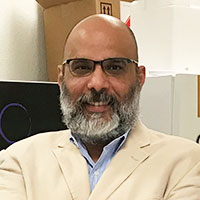Organizing Committee

Shri Mohan Jain
University of Helsinki, Helsinki, Finland
Adjunct Professor, Department of Agricultural Sciences, University of Helsinki, Helsinki, Finland; Ph.D., 1978, Jawaharlal Nehru University, New Delhi, India. He was a post doc fellow in Israel, USA;, visiting scientist/Professor in Japan, Malaysia, Germany, and Italy. He was a Technical Officer, Plant Breeding and Genetics, International Atomic Energy Agency (IAEA), Vienna, Austria. He is on editorial Board of Euphytica, In Vitro, Propagation of Ornamental Plants, Emirates J. Food and Agriculture; reviewer in Plant cell and organ culture, Plant cell reports, Annals of Botany. His publications are more than 160 in peer reviewed journals, book chapters, and conference proceedings; edited 58 books on In vitro haploid production, somatic embryogenesis, Genetic diversity and erosion, Biodiversity and conservation, Advances in Plant Breeding, protocols for somatic embryogenesis, date palm biotechnology, and medicinal plants; invited speaker and acted as a Chair person in several international conferences worldwide. He was awarded Nobel Peace Prize, 2005 in commemoration the awarding to IAEA of the Nobel Peace Prize for 2005; also former consultant to IAEA, the European Union, The Government of Grenada, Iranian date palm Company and the Egyptian Government. Currently his research interests are in somatic embryogenesis, Micro-propagation, doubled haploids, mutagenesis mainly in medicinal plants, date palm, and banana, ornamentals genetic diversity, erosion, conservation, and utilization in the context of climate change and food and nutritional security.

Zhu Defeng
China National Rice Research Institute (CNRRI), China
He is a principal scientist of the Research and Development Center of Rice Production Technology, CNRRI; Director of Research Department of Cultivation and Fertilization, China National Rice Industry, and the leader of Rice Highly Effective Production Technology Innovation Research Team in CNRRI. His main research achievements are the creation of method and technology of aerobic irrigation in paddy rice system, theory and technology of rice intensification system, machine transplanting technology of pot-mat seedling, seedling matrix and seedling raising method for machine transplanting. Several rice cultivation technologies were applied as the leading technology by MOA in rice production. He has been awarded more than 10 Provincial/Ministerial Prizes for Science and Technology Progress or technology extension. He has received over 20 patents authorized in China, and published more than 150 scientific papers and 10 books. He is the Trustee of Chinese Society of Crop Science, Chinese Society of Rice Industry, and Chinese Society of Plant Nutrition and Fertilizer. He is the editorial committee member of Chinese Journal of Rice Science and vice editor of Rice science, as well as the Honorary Scientist of Rural Development Administration (2011-2013), Republic of Korea.

Mustafa Morsy
University of West Alabama
USA
Dr. Morsy earned his PhD degree in Cell and Molecular Biology from the University of Arkansas with research focused on plant response to abiotic stress. He continued his work on plant response to abiotic stress at the University of Nevada, Reno as a postdoctoral fellow. Later, at the Samuel Robert Noble Foundation, he studied the molecular mechanisms that govern plant-fungal-viral interaction that lead to increasing plant thermotolerance. In 2011, he joined the University of West Alabama (UWA) as a full-time faculty in the Department of Biology. The Morsy lab at UWA focuses at the discovery of novel endophytes that can be employed to improve crop productivity, under normal and abiotic stress conditions. His lab is using tomato and corn as model systems to test novel endophytes under greenhouse and field conditions. The Morsy lab identified many fungal endophytes that improve tomato and corn production under greenhouse and field conditions. The Morsy lab collaborates with several industry partners to develop biofertilizers to help with the dire need of increasing crop production to meet the demand of the growing global population and climatic changes. In addition, the Morsy lab studies the molecular mechanisms that control a three-way symbiosis between a plant, a fungus, and a mycovirus that lead to significant increase of plant heat tolerance. The Morsy lab research is funded by the National Science Foundation, the Alabama Department of Agriculture, and other private foundations. In addition, Mustafa is a committed educator who encourages undergraduate students’ involvement in research via independent studies in his lab and through research-based curriculum. He is the Principal Investigator of two National Science Foundation grants that focuses in improving undergraduate education at UWA, a minority serving institute, through implementation of a comprehensive research-based curriculum. Dr. Morsy serves as the Chair and co-founder of the UWA Research Symposium, and also chair of the annual Symposium of the Tiny Earth: Student Sourcing Antibiotic Discovery, a global network of more than 120 universities headquartered at the University of Wisconsin, Madison. Additionally, Dr. Morsy provides an outreach program to local K12 students through the Science Saturdays program he coordinates every fall and spring semester on UWA campus.
